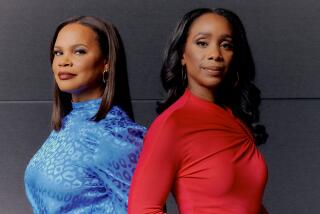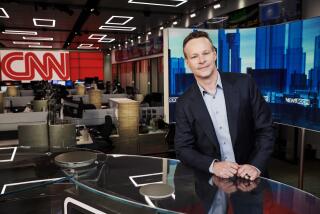WALTER CRONKITE: Anchored in History
- Share via
He is the most trusted man in TV news, known and loved as “Uncle Walter.” Now Walter Cronkite tells it the way it was on the new eight-part Discovery Channel series “Cronkite Remembers,” beginning Thursday.
In the intimate memoir--filled with humor, warmth and pathos--Cronkite gives a personal account of the major events of the past 65 years, including World War II, the birth of the Atomic Age, the Nuremberg Trials, the Cold War, the Korean War, the Vietnam War, the Civil Rights movement, the Kennedy and King assassinations, the space race and the Watergate scandal.
Born 80 years ago in St. Joseph, Mo., Cronkite began his career as a newsboy and became a campus reporter for the Houston Post while in high school. Joining United Press in 1937, he covered the major battles of World War II and the infamous Nuremberg war trials. He joined CBS News in the early 1950s and became the anchorman and managing editor of “The CBS Evening News” in 1962.
Cronkite, who retired from his anchor desk in 1981, has recently published his autobiography, “A Reporter’s Life.” He chatted over the phone from New York with Times Staff Writer Susan King about “Cronkite Remembers” and his feelings about TV journalism today.
Question: Is it a coincidence that your autobiography and the Discovery Channel series are arriving on the scene simultaneously?
Answer: Totally coincidental. The two were developed separately and the timing just happened to come out like this.
*
Q: Watching “Cronkite Remembers,” I felt like I was sitting in your living room listening to you reminisce about your life and the events that shaped this century.
A: Ah, great. That’s what we were trying to create. They were important years. There has never been a decade in American history like the ‘60s--and all of the rest of it: World War II, for goodness sake, and the recovery from World War II and the development of the Cold War and our civil rights battles. It was a mighty intensive half century. It gets pretty dull in the history books, but if you have got something like this to refer back to, with the pictures and the memories of somebody who was there, telling it in, I hope, a friendly informal fashion, I think it might be something that’s worthwhile having on the shelf.
*
Q: Is your book similar to the series or more of a straightforward autobiography?
A: Well, I hope [the book] is fairly conversational. I have never pretended to be a great writer. I am totally immodest about being a great reporter and a good news writer. I write fast and I write accurately, nearly as accurately as anybody can be, and that’s my skill. The book is sort of like the television program. I just kind of sat down and wrote about me, without any thought of writing a piece of literature--just telling the story.
*
Q: Were you surprised when you began these projects that you had seen and covered so many major historical events?
A: That’s absolutely the case. It dumbfounded me. I really hadn’t sat down and thought back. I am not a contemplative type, basically. I am much more of an action person and, as a consequence, I look forward to today and tomorrow and what’s breaking. To sit down and muse, as it were, about the past just kind of shook me up.
*
Q: Was legendary CBS journalist Edward R. Murrow your mentor?
A: He was more of an icon than a mentor, in the sense that we didn’t work together at all. I never had the opportunity to sort of sit at his feet and absorb his wisdom. He offered me a job during World War II, and I had at first accepted it over lunch. Then when I went back to the United Press, they impressed upon me what a brilliant career I had ahead, even though the money wasn’t nearly as much as CBS. I loved the United Press and really wanted to stay there. I called up Ed and reneged. I think he thought I was kind of using him, perhaps as a lever to increase my pay or something. I think he thought the less of me for that, but when the Korean War broke out seven or eight years later--I was now in broadcast in Washington--I sent him a telegram saying, ‘Is that job still open?’ He telephoned me back and said, ‘The job is open and when can you start?’
*
Q: Did you prefer being a news anchor over reporting from the field?
A: They were equally wonderful. I love every aspect of news work. The performance never was important to me. I know that’s hard to tell anybody because everybody thinks today you want to get in front of the camera. I really didn’t give a damn about being in front of the camera. I liked the idea of sitting there and helping mold the story for the day, helping to select the agenda that we would be covering that day. That was important. I really liked being out in the field [too], trying to develop a story, particularly if it was an action story of some kind, as opposed to simply an interview.
*
Q: What do you feel about news anchors today?
A: I feel very strongly in support of the anchors today and of their staffs--their reporters and their writers and their editors and producers. I feel sorry for them because they are really handcuffed today by the commercial considerations that are ratings and the necessity to get a bigger piece of the smaller pie that is network television ratings. As a consequence, they have to suffer with the evening news broadcasts that aren’t news, but features material, what we call back-of-the-book stuff. And that’s a tragedy for all of us.
*
Q: In a recent “Dateline NBC” interview, you surprised everyone when you revealed that CBS News basically ignored you and didn’t give you any projects after your retirement from the anchor desk 15 years ago.
A: I know it surprised me that I was caught saying it. I just as soon would have left my personal feelings about that rest in my own breast, if you please, but it got out. I am not retracting one word of it. I was disappointed with my treatment. I did feel hurt about it.
*
Q: Do you wish now you hadn’t retired?
A: If I had known I was going to be shut out of future contributions to CBS News, I would have stayed as anchor.
“Cronkite Remembers” airs Thursdays at 10 p.m. and Fridays at 1 a.m. through Feb. 20 on the Discovery Channel.
More to Read
The complete guide to home viewing
Get Screen Gab for everything about the TV shows and streaming movies everyone’s talking about.
You may occasionally receive promotional content from the Los Angeles Times.







